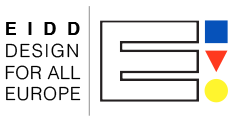Design for All
Design for All is design for human diversity, social inclusion and equality. This holistic and innovative approach constitutes a creative and ethical challenge for all planners, designers, entrepreneurs, administrators and political leaders.
Design for All aims to enable all people to have equal opportunities to participate in every aspect of society. To achieve this, the built environment, everyday objects, services, culture and information – in short, everything that is designed and made by people to be used by people – must be accessible, convenient for everyone in society to use and responsive to evolving human diversity.
The practice of Design for All makes conscious use of the analysis of human needs and aspirations and requires the involvement of end users at every stage in the design process.
From the EIDD© Stockholm Declaration, 2004
An overview that includes the people affected in the design process
We can say that Design for All has been the forerunner of co-design that we recently see more and more used in the design process. Including people, who are the expression of the needs and desires that a project must contain, is essential to have a solid reference framework. This enables continuous reviews on the project, starting from the initial requirements to the final phase, passing through the concept and all the intermediate steps of the process. In this way, the success and innovation of the project is often guaranteed.
The standard human being doesn’t exist. Instead, exists as a complex system with a variety of abilities. Just because Design for all is the design for human diversity, the progressive ageing of the world’s population is becoming more and more relevant every day, pushing us to build environments, services and products that are more and more attentive to fruibility and usability. And the elderly of today are people who don’t want to feel like old people, they are connected to the web and technologically educated thanks to mobile devices. In this context, the dignity of people will be increasingly important as much as the charm and emotion that products will have to express.














